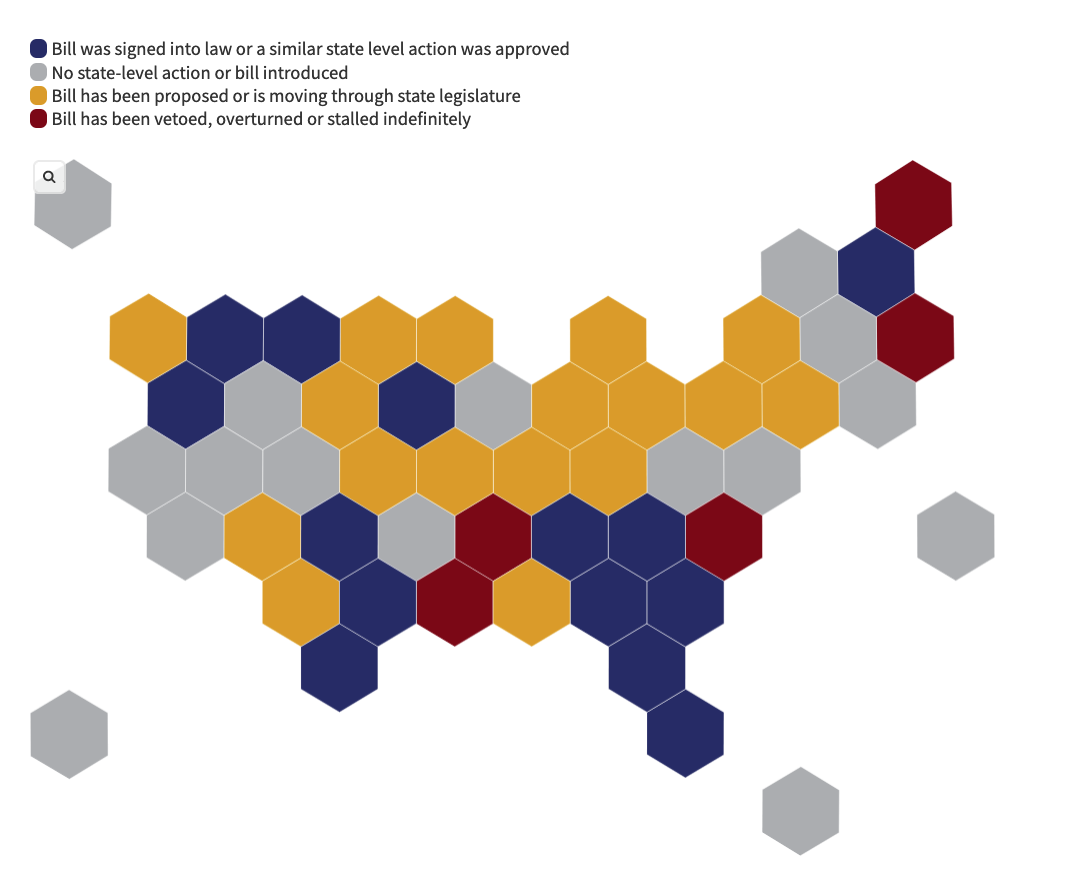School Gag Orders
Critical Analysis
According to the data from the map above, how many states now have bans or restrictions limiting how teachers can discuss race or sex?
There have been a spate of educational gag orders passed by lawmakers in at least 14 states over the past year. The laws and executive actions place restrictions on how teachers can discuss race, gender, sexual identity and American history in their classrooms. You can find all of these restrictions here. According to the data from the map above, does your state limit or restrict how teachers can discuss race or sex?
According to the data from the map above, what percent of American public schools are now subject to educational gag orders?
Describe any geographical trends in where these bans or restrictions are in place.
Over the past year, in Tennessee, a group of parents tried to remove an autobiography of Ruby Bridges, the first black student to integrate a southern elementary school. In another county in Tennessee, the school board voted unanimously this month to ban “Maus,” a Pulitzer Prize-winning graphic novel about the Holocaust, from being taught in its classrooms because the book contains material that board members said was inappropriate for students. In Texas, a school administrator warned teachers they would have to include “opposing” views on the Holocaust in their classrooms. I believe that the Holocaust was bad. Do you agree with the Texas school administrator who thinks that opposing views on the Holocaust should be taught?
In Iowa, school districts are purging books containing LGBTQ themes from their libraries. Political culture, a set of shared views and judgments held by a population regarding its political system. What do these bans tell us about American political culture?
The 1619 Project is an ongoing initiative from The New York Times Magazine that began in August 2019, the 400th anniversary of the beginning of American slavery. It aims to reframe the country’s history by placing the consequences of slavery and the contributions of black Americans at the very center of our national narrative. Many of these restrictions focus on banning the teaching of the 1619 Project. Here is an example of a proposed ban in Alaska HB228: Bans public K-12 schools and colleges from compelling students to adopt or affirm certain ideas about race, sex, ethnicity, religion, color, or national origin. Prohibits these institutions from making any use of the 1619 Project. Why do you think so many states have suddenly decided to limit teachers’ ability to teach current events involving issues of race or sex?
What is one consequence of all these bans and restrictions on what teachers can discuss in class?
Since January 2021, 36 states have introduced bills or taken other steps that would restrict teaching critical race theory or limit how teachers can discuss racism and sexism, according to an Education Week analysis. Fourteen states have imposed these bans and restrictions either through legislation or other avenues. Explain how American education demonstrates the concept of federalism in U.S. politics?
A culture war is a cultural conflict between social groups and the struggle for dominance of their values, beliefs, and practices. The battle over critical race theory and education is an example of a culture war. Culture wars are often waged to keep people from focusing on other pressing economic issues. Who do you think will win this culture war?
Learning Extension
Scan this Educational Gag Order Index from Pen America and see if your state is on it!
Action Extension
Contact your state legislator and governor and let them know what you think about gag orders in your state.
Bonus Action Extension
Breaking News: In McMinn County Tennessee the school board voted unanimously this month to ban “Maus,” a Pulitzer Prize-winning graphic novel about the Holocaust, from being taught in its classrooms because the book contains material that board members said was inappropriate for students. Contact the McMinn School Board and let them know what you think about their decision.
Visual Extension
Since January 2021, 36 states have introduced bills or taken other steps that would restrict teaching critical race theory or limit how teachers can discuss racism and sexism, according to an Education Week analysis. Fourteen states have imposed these bans and restrictions either through legislation or other avenues.


